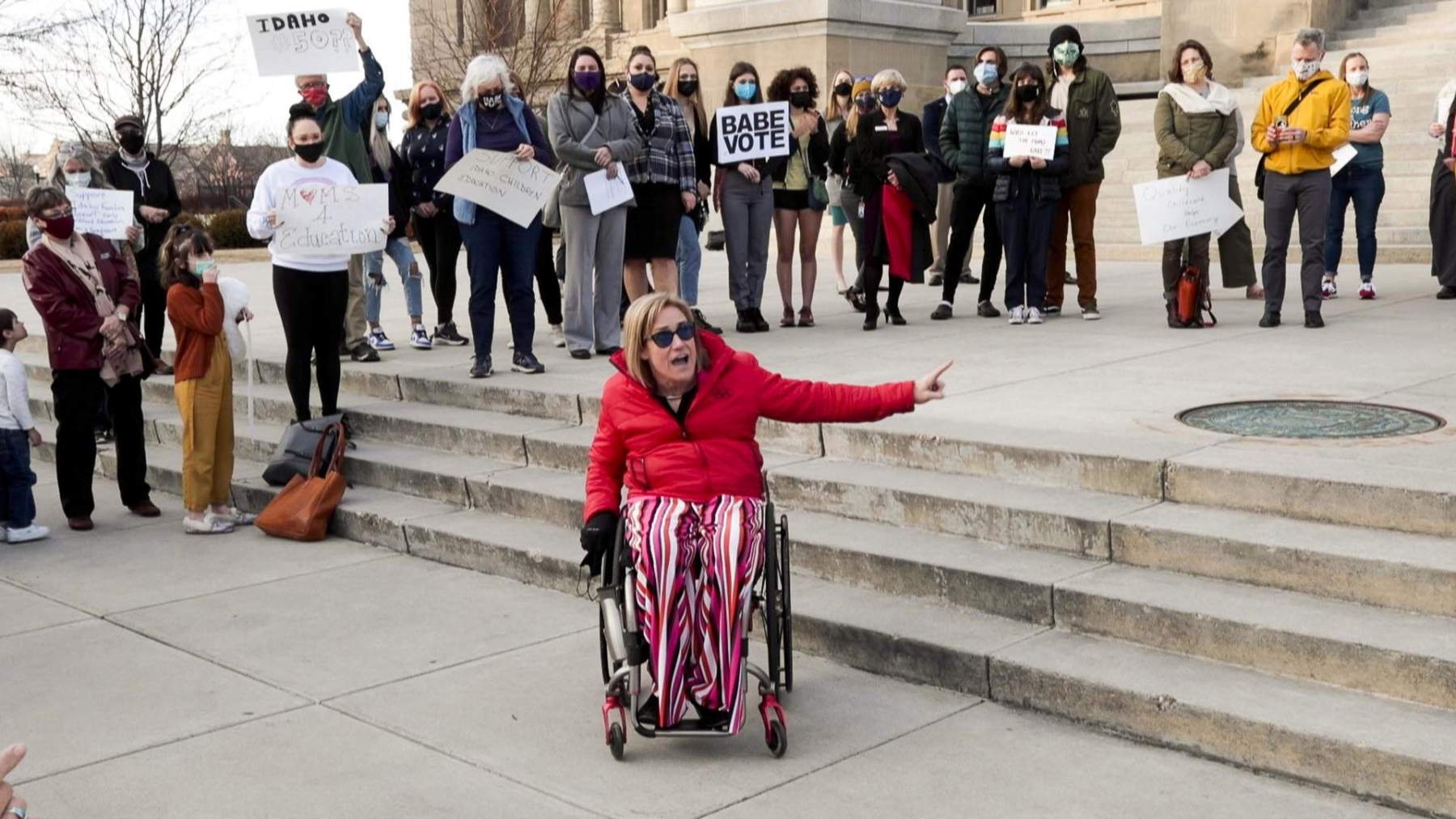More than 75 people, the majority of them women and many with children, stood outside the Idaho statehouse, holding signs reading “Working mom. My kids are doing great.” One young girl was chanting, “I have a kick-ass mom.”
Idaho state Rep. Muffy Davis, a Democrat, said she never thought she would have to defend working moms.
“We aren’t in the 1800s here. And all women don’t have to stay at home and care for the kids,” Davis said. “That’s not how it works here.”
Davis attended the protest Wednesday, a day after Idaho’s Republican-led House of Representatives rejected a nearly $6 million federal grant aimed at improving access to early education and child care. The grant would have gone directly to the Idaho State Board of Education, which would partner with the nonprofit Idaho Association for the Education of Young Children to help distribute the funds for child care and early education in Idaho for kids 5 and under. Lawmakers who opposed the grant said that they worried about the power being given to the nonprofit distributing the grant and that moms should ideally be the primary caretakers of their children.
“I don’t think anybody does a better job than mothers in the home, and any bill that makes it easier or more convenient for mothers to come out of the home and let others raise their child, I don’t think that’s a good direction for us to be going,” Rep. Charlie Shepherd, a Republican, said Tuesday during discussion of the bill. “We are really hurting the family unit in the process.”
On Wednesday, Shepherd apologized, saying his “remarks sounded derogatory, offensive and even sexist.” But Davis said the harm has been done.
“Words hurt. They last,” Davis said. “More women have left the workforce, and grants like these are programs to enable women so they don’t have to.”
The funding would help expand access to child care — including day care options, homeschooling opportunities and kindergarten entrance programs — particularly for Idaho’s rural population, many of whom currently do not have access to early education. Nearly 50 percent of Idaho residents live in rural areas, Davis said.
In the midst of the nation’s first-ever women’s recession, in which nearly 2.4 million women have exited the workforce since last February and child care centers are closing down, advocates fear this will only harm the child care industry further.
The industry already had slim profit margins and now has added expenses related to pandemic safety, Laura Dallas McSorley, director of early childhood policy at the left-leaning Center for American Progress, said in a statement to The 19th. “The decision to reject funding signed into law by former President Trump will undoubtedly cause many of these centers to falter — costing hundreds of Idaho child care workers their jobs, making it even more difficult for families to access high-quality, affordable child care, and impairing the state’s recovery from the pandemic and economic crisis.”
Sixty percent of U.S. households rely on two incomes to make ends meet, and nearly one-fifth of people in the United States — and over one-third of U.S. children — live in households where women are the primary breadwinner. Studies show that limiting child care options reduces women’s employment opportunities and household income.
“When Idaho’s lawmakers decline investments in their child care system, they wrongly assume this will create incentives for women to stay home with their children,” Jennifer Greenfield, an associate professor at the University of Denver and an expert in child care, said in a statement to The 19th. “Instead, they send more households into poverty. Working moms without access to affordable, reliable childcare face heart-wrenching choices about whether they can work to support their families and how to keep their children safe while they do so. Many will end up relying on public benefits when they would have preferred to work.”
The two-hour heated debate on the floor of the Idaho statehouse included criticism from Republican legislators of the nonprofit organization that would be distributing the funds to child care operations.
According to the Idaho Press, Rep. Priscilla Giddings began by asking: “Good gentleman, are you aware if this nonprofit has provided any support or if they would encourage or support the teaching of the Pledge of Allegiance?”
The debate soon took a turn to focus on how the nonprofit could enforce a “social justice curriculum” on their children, fearing for the erasure of a more conservative education system. Giddings rejected the idea of gender- or race-based privilege, according to the Idaho Spokesman.
Rep. Paul Amador, a Republican who sponsored the bill, said the association was identified by the state education board, which has used it before.
“They’ve been utilizing their services for the past year, and this organization makes a lot of sense to fulfill those needs. So don’t think we’re giving $6 million straightaway to an organization with no strings attached,” Amador said, according to the Spokesman.
Rep. Brooke Green, a Democrat, said that many of her colleagues seemed to have an outdated idea of what a family looks like and that financially stable households in her community typically need two working parents.
Green, in an interview with The 19th, bemoaned “this idea that we all have to toe the line to be this particular perfect, nuclear family and have these values.” We must “recognize [that] the reality of our neighbors, our families, our communities, is entirely different,” she said. Green recalled her mom working multiple jobs and how she sometimes slept on the floor of her mom’s night shift job.
Green and Davis hope their outspoken efforts will bring back House Bill 226. In the meantime, advocates and child care experts fear it will further harm women and working families.
“The COVID-19 pandemic has laid bare how essential our childcare system is to ensuring economic stability for America’s families,” Greenfield said. “A thriving childcare system is essential to a thriving state.”





